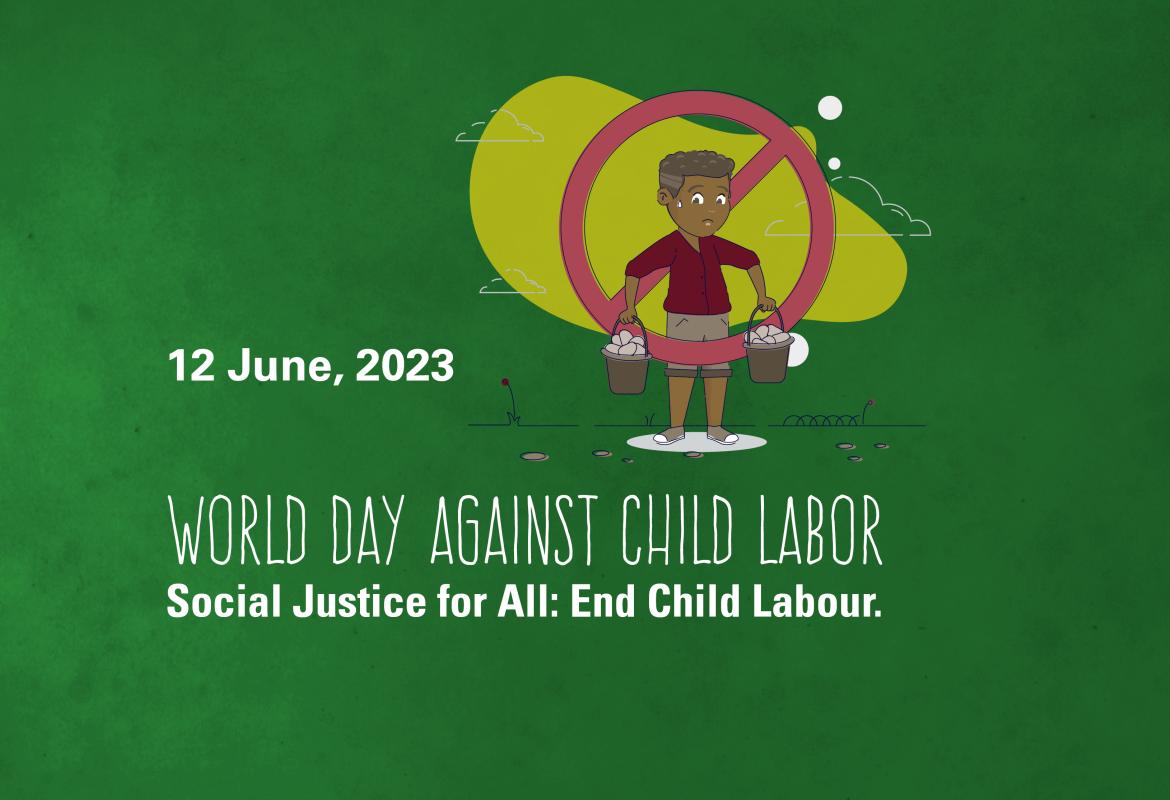The African Committee of Experts on the Rights and Welfare of the Child’s Working Group on Children’s Rights and Business joins the world today in commemorating the World Day against Child Labour under the theme Social Justice for All: End Child Labour.
The Committee’s Working Group on Children’s Rights and Business welcomes this year’s theme which calls for reinvigorated international action to achieve social justice, particularly under the envisaged Global Coalition for Social Justice, with child labour elimination as one of its important elements. The Committee’s Working Group notes that this theme is timely and important to accelerate social justice for the elimination of child labour in all its forms. The Working Group further notes that the theme is in line with the rights and aspirations prescribed under article 15 of the African Charter on the Rights and Welfare of the Child (ACRWC), Aspiration 7 of Africa’s Agenda for Children 2040, and goal 8 of the Sustainable Development Goals (SDGs), which all call for the elimination of child labour.
Whilst acknowledging the efforts by AU Member States to eradicate child labour and the improvements made in economic growth, reduction of poverty, improvement of average real wages and levels of education, serious concerns remain with rising poverty, inequalities, unemployment, and unfair labour practices. In addition, there are increased numbers of children not in education or training and high numbers of children engaged in child labour. The region continuously faces high levels of child trafficking and governance gaps. The consequences of the COVID-19 pandemic, climate change, armed conflicts, and tensions have, in the previous years, worsened the economic situation in the continent, reversed the limited human development gains made in the region and continue to pose a major threat to sustainable development. The low social protection coverage exacerbates the economic vulnerabilities of children and their parents seeking livelihoods. In the absence of mitigation strategies for such inequalities and crises, most families and households are forced to resort to child labour as a survival and sustainability strategy.
Child labour constitutes violence against children and violates children’s rights enshrined in the African Children’s Charter, such as the right to survival and development, education, health, protection against child labour, protection against child abuse and torture, and protection from sexual exploitation. This indicates the inextricable link between social justice and child labour and the need for concerted actions to address the root causes of child labour by advancing social justice in national, regional, and global policymaking and activities.
While commemorating this significant day, the Committee, through its Working Group, seizes the opportunity to remind Member States of their obligation to prohibit and eradicate child labour and its driving factors in accordance with article 15 of the African Children’s Charter and the standards developed by the Committee in its Agenda 2040, General Comment No. 7 on article 27 of the ACRWC; General Comment No. 6 on article 22 of the ACRWC; General Comment on article 1; General Comment on article 6; General Comment on article 31; and the Joint General Comment on Child Marriage, and other continental laws, policies, guidelines and strategies in place such as the AU Agenda 2063, the AU’s Action Plan to Eradicate Child Labour, Forced Labour, Human Trafficking and Modern Slavery (2020-2030), and the Abidjan Declaration on Advancing Social Justice. In all efforts to advance social justice and eradicate child labour, particular attention should be paid to children in vulnerable situations, such as children on the move, children without parental care, children with disabilities, and children in situations of fragility and crisis.
The Committee, through the Working Group on Children’s Rights and Business, therefore, urges Member States to:
- Prohibit all forms of child labour by setting a minimum age of employment to at least 15 years and ensure the effective implementation of laws prohibiting child labour;
- Develop systems for providing children removed from hazardous work and worst forms of child labour with support services and training;
- Provide universal access to quality education by children;
- Adopt child-friendly business policies and practices, and support programmes to provide learning and skilling opportunities for children and young people to enable them to earn a safe, decent living to escape multi-dimensional poverty;
- Adopt and implement family-friendly policies, including employment income protection, paid leave and care for family members, flexible working arrangements, and access to quality emergency childcare;
- Mitigate economic vulnerabilities associated with child labour, such as introducing or expanding child-sensitive social protection programmes to poor, marginalized and vulnerable households; and
- Extend minimum wage protections to young workers in the informal based economy
Business enterprises are urged to:
- Contribute towards the elimination of child labour by not recruiting children and by establishing robust age-verification mechanisms as part of recruitment processes;
- Ensure due diligence processes are undertaken and child-safeguarding policies are developed to protect young workers from harmful labour, sexual exploitation, harassment, and abuse in the workplace
- Promote safe and decent work opportunities for young workers, including age-appropriate social protection and health information and services;
- Meet their responsibility to respect and support children’s rights, including through undertaking strategic social investments programmes for children in partnership with governments, civil society and children;
- Collaborate with governments and other social partners in promoting access to education and social protection by all children as a way of addressing the root causes of child labour; and
- Take steps to maximize the accessibility and availability of safe, healthy, and environmentally friendly products and services that are essential to children’s survival and development
Civil Society Organizations and other non-governmental organizations are called upon to:
- Increase awareness raising, policy and advocacy, research, analysis, and information dissemination on child labour and social justice; and
- Support efforts to eliminate child labour, including through social mobilization and awareness raising, and programmes to eradicate child labour that are designed and carried out in cooperation with governments, businesses, communities and children







